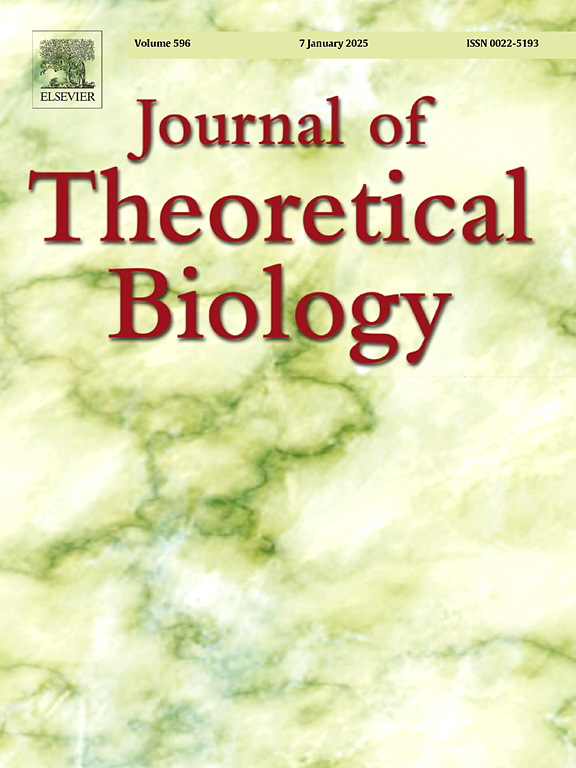Incorporating adult age into mosquito population models: Implications for predicting abundances in changing climates
IF 1.9
4区 数学
Q2 BIOLOGY
引用次数: 0
Abstract
Mosquito-borne diseases (MBDs) pose increasing threats under future climate change scenarios and an understanding of mosquito population dynamics is pivotal to predicting future risk of MBDs. Most models that describe mosquito population dynamics often assume that adult life-history is independent of adult age and yet mosquito senescence is known to affect mosquito mortality, fecundity and other key biological traits. Despite this, little is known about the effects of adult age at the level of the mosquito population, especially under varying temperature scenarios. We develop a stage-structured delayed differential equations (DDEs) model incorporating the effects of the abiotic environment and adult age to shed light on the complex interactions between age, temperature, and mosquito population dynamics. Taking Culex pipiens, a major vector of West Nile Virus, as our study species our results show that failing to consider mosquito senescence can lead to underestimates of future mosquito abundances predicted under climate change scenarios. We also find that the age-dependent mechanisms combined with the effects of density-dependent mortality on the immature stages can result in mosquito abundances decreasing at extreme temperatures. With our work, we underscore the need for more studies to consider the effects of mosquito age. Not accounting for senescence can compromise the accuracy of abundance estimates and has implications for predicting the risk of future MBD outbreaks.
将成人年龄纳入蚊子种群模型:预测气候变化丰度的意义。
蚊媒疾病(MBDs)在未来气候变化情景下威胁越来越大,了解蚊子种群动态是预测未来MBDs风险的关键。大多数描述蚊子种群动态的模型通常假设成年生活史与成年年龄无关,然而已知蚊子衰老会影响蚊子的死亡率、繁殖力和其他关键生物学性状。尽管如此,人们对成人年龄对蚊子种群水平的影响知之甚少,特别是在不同温度的情况下。我们建立了一个包含非生物环境和成人年龄影响的阶段结构延迟微分方程(DDEs)模型,以揭示年龄、温度和蚊子种群动态之间复杂的相互作用。以西尼罗病毒的主要传播媒介库蚊为研究对象,研究结果表明,不考虑蚊子衰老可能会导致在气候变化情景下预测未来蚊子丰度的低估。我们还发现,在极端温度下,年龄依赖机制结合密度依赖死亡率对未成熟阶段的影响可能导致蚊子丰度下降。通过我们的工作,我们强调需要进行更多的研究来考虑蚊子年龄的影响。不考虑衰老可能会损害丰度估计的准确性,并对预测未来MBD爆发的风险有影响。
本文章由计算机程序翻译,如有差异,请以英文原文为准。
求助全文
约1分钟内获得全文
求助全文
来源期刊
CiteScore
4.20
自引率
5.00%
发文量
218
审稿时长
51 days
期刊介绍:
The Journal of Theoretical Biology is the leading forum for theoretical perspectives that give insight into biological processes. It covers a very wide range of topics and is of interest to biologists in many areas of research, including:
• Brain and Neuroscience
• Cancer Growth and Treatment
• Cell Biology
• Developmental Biology
• Ecology
• Evolution
• Immunology,
• Infectious and non-infectious Diseases,
• Mathematical, Computational, Biophysical and Statistical Modeling
• Microbiology, Molecular Biology, and Biochemistry
• Networks and Complex Systems
• Physiology
• Pharmacodynamics
• Animal Behavior and Game Theory
Acceptable papers are those that bear significant importance on the biology per se being presented, and not on the mathematical analysis. Papers that include some data or experimental material bearing on theory will be considered, including those that contain comparative study, statistical data analysis, mathematical proof, computer simulations, experiments, field observations, or even philosophical arguments, which are all methods to support or reject theoretical ideas. However, there should be a concerted effort to make papers intelligible to biologists in the chosen field.

 求助内容:
求助内容: 应助结果提醒方式:
应助结果提醒方式:


